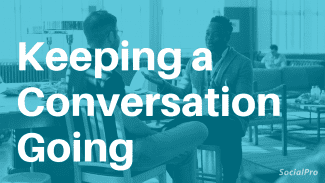One of the most uncomfortable moments you can experience in a social setting is a conversation that lasts longer than it should.
Maybe you missed the opportunity to gracefully end the conversation, or perhaps you find it difficult to tell when people are finished talking.
The following tips will provide a list of things to look for so that you can avoid the awkwardness of prolonging an expired conversation.
1. Analyze the Conversation
Think about how the conversation has progressed up to this point. Here are some things to consider to know when the conversation is over:
- Has the conversation already lasted an appropriate amount of time?
- (5-10 minutes in a casual setting)
- Have we finished discussing the conversation’s original purpose?
- (If you wanted to ask about the person’s new job, have you finished discussing that?)
- Did we ask general questions to “catch up” on each other’s lives?
- (“How’s work going?”, “Are you still planning on moving?”, etc.)
- Have we run out of things to talk about/encountered multiple silences in the conversation?
If the answer is “yes” to one or more of these questions, then it sounds like you’ve had a complete conversation that could be ready to end. The next step is to look for non-verbal cues that indicate the person is ready to exit the conversation.
2. Watch for Non-Verbal Cues
If the conversation is at its end, the other person will likely be exhibiting body language cues that signal that the conversation is over. Are they:
- Checking their phone?
- Looking at their watch?
- Acting distracted?
- Packing up their things/preparing to leave?
- Standing up when they were previously sitting?
- Focusing on other people/things in the room (instead of you)?
- Fiddling (shifting weight from one foot to the other, messing with their hair, clothing, etc.)?
- Working on other things while you’re talking?
If someone is doing these things, take it as a sign that it’s time to end the conversation (and start a new conversation with someone else).
3. Listen for Verbal Cues
When people are ready to end a conversation, there are certain things they will say that you should be listening for. Sometimes it can be difficult to tell whether they are trying to exit the discussion or simply making friendly small talk, so use this list of “closing statements” as a reference point.
- Summarizing the conversation
- “Well I’m glad to hear you found your earring!”
- “Sounds like you’re doing really well!”
- “I’m sorry to hear about your bike, but keep me updated on the car search!”
- Closing pleasantries
- “It was nice talking to you!”
- “Good to see you again!”
- “I’m glad we got to catch up!”
- Statements of departure
- “Well, I’d better get going.”
- “It’s getting late! I should start heading home.”
- “I have somewhere to be.”
- References to other tasks
- “I’ve got a lot of work piling up!”
- “I should really get back to work.”
- “Ugh, I have so much to do!”
- “I have a lot of errands to run today.”
- Making plans to meet/talk later
- “I need to get going, but can we talk later?”
- “I’m sorry to cut this short, but let’s meet for coffee tomorrow so you can finish your story.”
- “Let’s grab dinner soon!”
- “Can I call you later to pick up where we left off?”
Any of these phrases (or similar statements) are clear indicators that the conversation is ending. At this point, it would not be appropriate to continue talking, and your response should comply with the person’s efforts to close the conversation.
If you’ve ever been in a situation where someone wouldn’t stop talking, you know how uncomfortable it can be. Even worse is when you realize–too late– that you were the one prolonging a conversation that was ready to end. Brushing up on some verbal and body language cues that signal that a conversation is over is an easy way to avoid this embarrassing scenario.
What is your go-to phrase for ending a conversation? Share in the comments!












